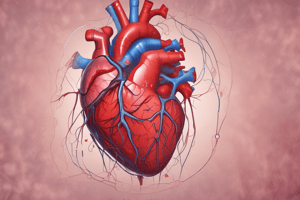Podcast
Questions and Answers
Which chamber of the heart is responsible for pumping blood to the rest of the body?
Which chamber of the heart is responsible for pumping blood to the rest of the body?
- Right atrium
- Left ventricle (correct)
- Left atrium
- Right ventricle
What is the primary cause of angina pectoris and myocardial infarction?
What is the primary cause of angina pectoris and myocardial infarction?
- Heart failure
- Hypertension
- Atherosclerosis (correct)
- Valvular heart diseases
Where is the sinoatrial (SA) node located in the heart?
Where is the sinoatrial (SA) node located in the heart?
- Left ventricle
- Right atrium (correct)
- Left atrium
- Right ventricle
Which technique is used to record the electrical activity of the heart?
Which technique is used to record the electrical activity of the heart?
What are the two broad categories of cardiovascular diseases mentioned in the text?
What are the two broad categories of cardiovascular diseases mentioned in the text?
Which node is located between the right atrium and the left ventricle in the heart's electrical system?
Which node is located between the right atrium and the left ventricle in the heart's electrical system?
Flashcards are hidden until you start studying
Study Notes
Cardiology: An In-Depth Look at Cardiovascular Diseases, Heart Anatomy, and Electrocardiography
Cardiovascular Diseases
Cardiovascular diseases refer to a group of conditions that affect the heart and blood vessels. These diseases can be broadly classified into two categories: coronary heart disease (CHD) and non-coronary heart disease. CHD includes conditions such as angina pectoris (chest pain) and myocardial infarction (heart attack), which are primarily caused by atherosclerosis (narrowing and hardening of the arteries). Non-coronary heart diseases include heart failure, valvular heart diseases, and arrhythmias, among others.
Heart Anatomy
The heart is a muscular organ that functions as a pump to circulate blood throughout the body. It is divided into four chambers: the left and right atria (upper chambers) and the left and right ventricles (lower chambers). The heart's electrical system controls the heartbeat, and the rhythm is maintained by a specialized group of cells called the sinoatrial (SA) node, which is located in the right atrium. The electrical signal, generated by the SA node, travels through the atrioventricular (AV) node, located between the right atrium and the left ventricle, and then to the ventricles.
Electrocardiography
Electrocardiography (ECG) is a technique used to record the electrical activity of the heart. The ECG records the electrical signals produced by the heart as it contracts and relaxes. The resulting waveform, known as an ECG trace, provides information about the heart's electrical activity, rhythm, and conduction system. It can be used to diagnose various heart conditions, including arrhythmias, ischemia (reduced blood flow to the heart muscle), and structural heart diseases.
In summary, cardiology is a field of medicine that focuses on the diagnosis, treatment, and prevention of cardiovascular diseases. Understanding the anatomy of the heart and the mechanisms of electrocardiography is crucial for the timely diagnosis and management of various heart conditions.
Studying That Suits You
Use AI to generate personalized quizzes and flashcards to suit your learning preferences.



